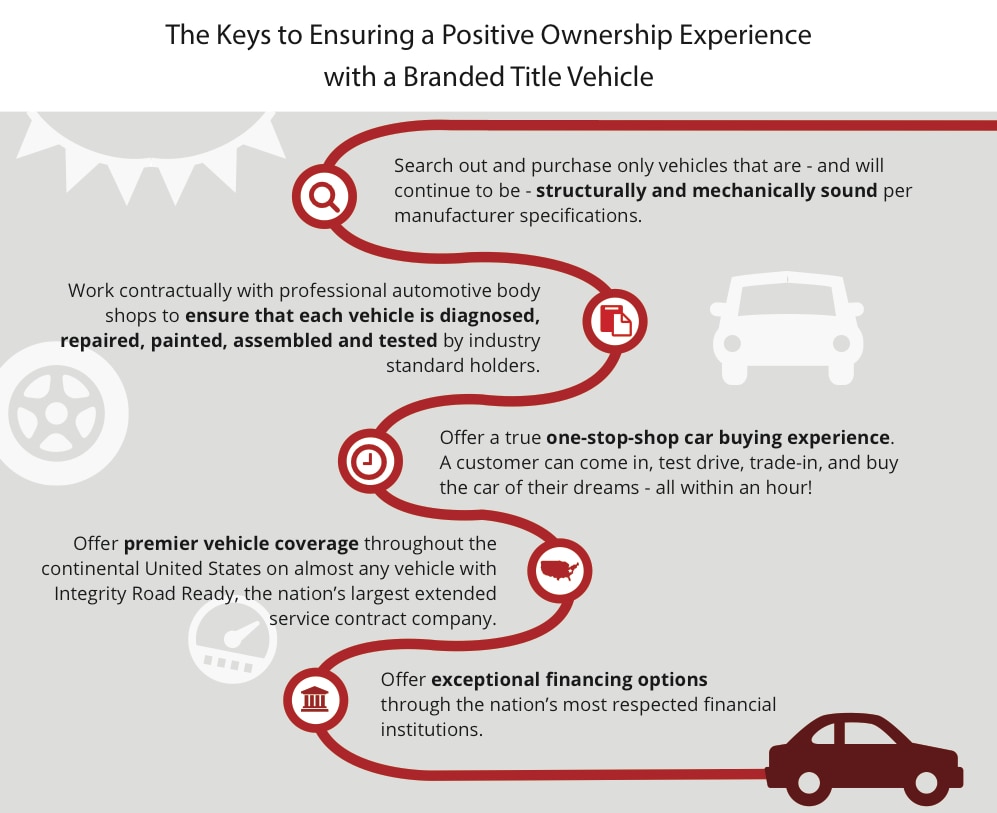What Is A Branded Title On A Car? A Comprehensive Guide
What Is A Branded Title On A Car? A Comprehensive Guide cars.truckstrend.com
Buying a car is one of the most significant purchases many people make, and understanding every detail of a vehicle’s history is paramount. While most buyers seek out cars with "clean titles," there’s another category that often surfaces in the market: vehicles with "branded titles." Far from being a mere administrative detail, a branded title signals a significant past event in a car’s life, carrying implications for its value, safety, and insurability.
In essence, a branded title is a permanent mark on a vehicle’s record, issued by a state’s Department of Motor Vehicles (DMV) or equivalent agency, indicating that the vehicle has sustained severe damage, has a specific history, or meets certain criteria that distinguish it from a standard "clean" vehicle. This mark serves as a crucial consumer protection mechanism, alerting prospective buyers to potential issues or a reduced market value. Understanding what a branded title means, its various forms, and its repercussions is essential for anyone navigating the used car market, whether as a buyer or a seller.
What Is A Branded Title On A Car? A Comprehensive Guide
Understanding the Basics: What Exactly is a Branded Title?
A branded title, sometimes referred to as a "salvage title," "rebuilt title," or "reconstructed title," is a type of vehicle ownership document that indicates the car has experienced a significant event that severely impacts its market value, safety, or structural integrity. Unlike a "clean title," which suggests a vehicle has never been declared a total loss by an insurance company or suffered major damage, a branded title carries a permanent disclosure of its history.
The primary purpose of a branded title is consumer protection. It ensures transparency, informing future buyers that the vehicle has a past event that warrants caution. Without such branding, a severely damaged vehicle could be repaired cosmetically and sold to an unsuspecting buyer at a clean-title price, potentially putting them at risk financially and physically. The specific criteria for branding a title vary by state, but generally, it involves damage exceeding a certain percentage of the vehicle’s actual cash value, often between 70% and 90%.
Common Types of Branded Titles
Not all branded titles are created equal. The specific brand on a title denotes the nature of the vehicle’s past incident. Here are the most common types:
- Salvage This is perhaps the most well-known branded title. A vehicle receives a salvage title when an insurance company declares it a "total loss." This typically happens when the cost to repair the damage (from an accident, flood, fire, theft, etc.) exceeds a certain percentage of the car’s market value, or if the vehicle is stolen and not recovered within a specific timeframe. A salvage-titled car is usually not roadworthy and cannot be legally driven until it undergoes repairs and passes a state inspection.
- Rebuilt/Reconstructed Once a vehicle with a salvage title has been professionally repaired and inspected by the state to ensure it meets safety standards and is roadworthy, its title can be upgraded to "rebuilt" or "reconstructed." This indicates that while it was once a total loss, it has since been restored and deemed safe for operation. However, the "rebuilt" brand remains permanently on the title, signaling its history.
- Flood This specific brand is applied to vehicles that have sustained significant water damage, typically from floods. Water damage can be particularly insidious, leading to long-term electrical, mechanical, and rust issues that may not be immediately apparent. Even after drying and repair, a flood-damaged car can pose reliability challenges.
- Lemon In some states, a vehicle that has been repurchased by the manufacturer under "lemon laws" (due to persistent, unfixable defects after multiple repair attempts within the warranty period) will receive a "lemon" brand on its title. This alerts future buyers to the vehicle’s history of unresolved issues.
- Odometer Rollback If a vehicle’s odometer has been illegally altered to show fewer miles than it has actually traveled, its title may be branded to indicate "odometer rollback" or "not actual mileage." This protects consumers from fraud.
- Junk/Scrap A "junk" or "scrap" title is issued for vehicles that are deemed irreparable and are intended only for parts or demolition. These vehicles are not roadworthy and cannot be legally registered or driven.
- Hail Damage In areas prone to severe hail storms, vehicles with significant hail damage (often cosmetic, but extensive) may receive a specific hail damage brand, especially if the cost of repairing the body damage is substantial.
- Theft Recovery While less common as a direct brand, a vehicle stolen and later recovered may be issued a salvage title if it sustained significant damage or missing components during the theft.
/filters:quality(60)/2020-11-20-What-Is-a-Branded-Title-inline-table.png)

The Pros and Cons of Buying a Branded Title Car
Purchasing a vehicle with a branded title can be a double-edged sword. It offers potential benefits but also carries significant risks.
Pros:

- Significantly Lower Purchase Price: The most obvious advantage is the reduced cost. Branded title vehicles are often priced 20% to 50% lower than their clean-title counterparts, making them an attractive option for buyers on a tight budget or those looking for a luxury car they otherwise couldn’t afford.
- Opportunity for Value: If the damage was minor (e.g., cosmetic hail damage or theft recovery with minimal actual damage) and the repairs were performed exceptionally well, you could potentially get a well-functioning vehicle for a fraction of the cost.
- Project Car Potential: For mechanics or those with automotive expertise, a branded title car can be an excellent project, offering a chance to apply skills and save money.
Cons:
- Difficulty Getting Financing: Many traditional lenders (banks, credit unions) are reluctant or refuse outright to finance branded title vehicles due to the perceived higher risk and lower collateral value.
- Insurance Challenges: Securing comprehensive and collision insurance can be difficult, if not impossible. Insurers may only offer liability coverage, or if they offer full coverage, the payout in case of a future claim might be based on the vehicle’s reduced branded-title value, not its pre-damage market value.
- Lower Resale Value: The "brand" is permanent. When it comes time to sell, you will face the same challenges and a significantly reduced market. The pool of potential buyers will also be smaller.
- Potential for Hidden Damage: Even with professional repairs, there’s always a risk of underlying or long-term issues, especially with flood damage (electrical corrosion) or severe structural damage.
- Safety Concerns: If repairs were shoddy or shortcuts were taken, the vehicle’s safety features (e.g., crumple zones, airbag deployment) might be compromised.
- More Difficult to Sell: Selling a branded title car typically takes longer and requires more effort to find a willing and informed buyer. Dealerships are often unwilling to take them as trade-ins or will offer very little.
Key Considerations Before Buying a Branded Title Car
If you’re contemplating purchasing a branded title vehicle, thorough due diligence is non-negotiable. Here’s practical advice:
- Mandatory Pre-Purchase Inspection (PPI): This is the single most important step. Hire an independent, certified mechanic (preferably one specializing in the vehicle’s make and model) to perform a comprehensive inspection. Do not rely solely on the seller’s assurances or a state-mandated "rebuilt" inspection, which may only cover basic safety. The mechanic should specifically look for signs of the type of damage indicated by the brand (e.g., rust and wiring issues for flood, frame alignment for accident).
- Obtain a Vehicle History Report (VHR): Purchase a report from reputable services like CarFax or AutoCheck. These reports will detail the branding, the reported incidents, service history, and previous ownership. Pay close attention to the nature of the damage and when it occurred.
- Demand Proof of Repairs: Ask the seller for all repair documentation, including receipts for parts, labor, and photos of the repair process. Understand who performed the repairs – a certified body shop or an individual?
- Understand Financing Challenges: Before you fall in love with the car, talk to your bank or credit union. Be prepared for a higher down payment, higher interest rates, or the need to secure a personal loan rather than an auto loan. Many won’t finance these vehicles at all.
- Contact Your Insurance Provider: Get an insurance quote before you buy. Be transparent about the branded title. Understand what type of coverage they will offer and how a future claim payout would be calculated.
- Research State-Specific Laws: Branded title laws vary significantly by state. Some states are more stringent than others regarding branding and disclosure. Ensure the vehicle’s title history aligns with your state’s regulations.
- Assess Your Risk Tolerance: Are you comfortable with the potential for future mechanical issues or a difficult resale process? If not, a branded title car might not be for you.
How Branded Titles Impact Insurance and Financing
The impact of a branded title extends significantly into the realms of insurance and financing, often creating hurdles for potential owners.
Insurance Implications:
- Limited Coverage Options: Many insurance companies are hesitant to offer comprehensive and collision coverage on branded title vehicles. They may only provide liability coverage, leaving you exposed to significant out-of-pocket costs if the vehicle is damaged in an accident.
- Lower Claim Payouts: If an insurer does provide full coverage, the payout in the event of a total loss (e.g., another accident or theft) will likely be based on the vehicle’s salvage value or a significantly depreciated market value, not what a clean-title version would be worth. This means you could receive substantially less than you expect, potentially leaving you upside down on your investment.
- Higher Premiums: Some insurers that do offer coverage may charge higher premiums due to the perceived increased risk and the vehicle’s compromised history.
Financing Implications:
- Difficulty Securing Loans: The vast majority of traditional lenders (banks, credit unions) will not provide financing for branded title vehicles. Their rationale is that the vehicle’s value is significantly reduced and highly volatile, making it poor collateral for a loan.
- Higher Interest Rates and Down Payments: If you do find a lender willing to finance, expect higher interest rates and potentially a larger required down payment to offset the increased risk.
- Alternative Financing: Buyers often resort to personal loans (which typically have higher interest rates and shorter terms) or private financing to purchase branded title cars, which can add to the overall cost and financial burden.
Tips for Selling a Branded Title Car
Selling a car with a branded title requires a different approach than selling a clean-title vehicle. Transparency, proper documentation, and realistic pricing are key.
- Full Disclosure is Paramount: Be completely upfront and honest about the vehicle’s branded title and the nature of the damage it sustained. Hiding this information is illegal and will erode trust, potentially leading to legal issues.
- Gather All Documentation: Have all repair records, receipts, photos of the repair process, and the Vehicle History Report readily available. This documentation builds buyer confidence and proves the work was done correctly.
- Price Realistically: Understand that your car will sell for significantly less than a comparable clean-title vehicle. Research the market for similar branded title vehicles to set a competitive price, typically 20-50% below clean-title market value.
- Highlight the Positives: Emphasize the quality of the repairs, any new components, and the overall good condition of the vehicle post-repair.
- Be Prepared for Questions and Skepticism: Buyers will be cautious. Be patient and willing to answer all their questions thoroughly. Encourage them to get their own independent inspection.
- Target the Right Audience: Branded title cars often appeal to mechanics, individuals on a very tight budget, or those looking for specific parts. Consider advertising in places where such buyers might look.
- Consider Private Sale: Dealerships rarely take branded title cars as trade-ins, or if they do, they offer a very low price, often wholesale value. A private sale usually yields a better return.
Impact on Vehicle Value: Branded vs. Clean Titles
The "price" of a branded title isn’t a direct cost, but rather its significant impact on the vehicle’s market value. The table below illustrates the typical depreciation compared to an identical clean-title vehicle.
| Title Type | Description | Typical Value Impact (vs. Clean Title) | Financing Availability | Insurance Availability (Full Coverage) |
|---|---|---|---|---|
| Clean Title | No significant adverse history reported. | 0% (Standard Market Value) | High | High |
| Rebuilt/Reconstructed | Formerly salvage, now repaired and inspected. | 20% – 40% less | Low to Moderate | Moderate to Low |
| Salvage Title | Declared a total loss; not roadworthy. | 50% – 80% less (or parts value) | Extremely Low/None | Very Low/None |
| Flood Title | Significant water damage; often prone to electrical issues. | 30% – 60% less | Low | Low |
| Lemon Title | Repurchased by manufacturer due to persistent defects. | 25% – 50% less | Low | Moderate |
| Odometer Rollback | Mileage altered; "Not Actual Miles" disclosure. | 30% – 60% less | Low | Moderate |
| Junk/Scrap Title | Deemed irreparable; for parts or recycling only. | 80% – 95% less (or scrap value) | None | None |
Note: These percentages are estimates and can vary widely based on the specific vehicle, the nature and extent of the damage, the quality of repairs, market demand, and state laws.
Frequently Asked Questions (FAQ)
Q1: Can a branded title ever be "cleaned" or removed?
A1: No, legally, a branded title is a permanent mark on a vehicle’s history. Once a title is branded, it will remain branded indefinitely. Any attempt to conceal or remove this brand is illegal and considered title washing.
Q2: Is it safe to drive a car with a branded title?
A2: It can be, but it depends entirely on the nature of the original damage and the quality of the repairs. A properly repaired and state-inspected "rebuilt" vehicle should be safe. However, always get an independent pre-purchase inspection from a trusted mechanic to verify safety and structural integrity.
Q3: Will a branded title car pass state inspections?
A3: If the vehicle has a "rebuilt" or "reconstructed" title, it means it has already passed a state-mandated inspection to deem it roadworthy after being salvaged. It should continue to pass regular annual inspections, provided it remains in good repair. However, requirements vary by state.
Q4: How much less is a branded title car worth compared to a clean-title one?
A4: Typically, a branded title vehicle will sell for 20% to 50% less than an equivalent clean-title vehicle. For vehicles with severe brands like "salvage" (not rebuilt) or "junk," the value can be 50% to 80% less, or simply parts/scrap value.
Q5: Can I get a warranty on a branded title car?
A5: A manufacturer’s new car warranty will likely be voided once a car receives a salvage title. Some third-party extended warranty providers might offer limited coverage, but it’s rare and often expensive. Always confirm directly with the warranty provider.
Q6: How can I check if a car has a branded title before buying?
A6: Always request a Vehicle History Report (VHR) from services like CarFax or AutoCheck using the car’s VIN. Additionally, physically inspect the title document itself; the brand should be clearly indicated on it. If a seller is unwilling to provide the VIN or show you the title, consider it a major red flag.
Conclusion
A branded title on a car is more than just a label; it’s a critical disclosure about a vehicle’s past that profoundly impacts its present value and future usability. While the allure of a significantly lower purchase price can be tempting, entering the world of branded titles requires an educated approach and meticulous due diligence.
For the informed and cautious buyer, a branded title vehicle, especially a well-repaired "rebuilt" one, can represent a fantastic value, allowing access to a better car than their budget might otherwise permit. However, the potential pitfalls—including financing and insurance difficulties, reduced resale value, and the risk of hidden issues—are substantial.
Ultimately, understanding what a branded title signifies, knowing the specific type of brand, and thoroughly investigating the vehicle’s repair history are non-negotiable steps. Proceed with caution, arm yourself with knowledge, and always prioritize an independent professional inspection. By doing so, you can navigate the complexities of branded titles and make a decision that is both financially sound and safe.



